Choosing Between Delta-9 and CBD Based on Your Wellness Goals
Understanding Delta 9 vs CBD: What You Need to Know
If you're comparing delta 9 vs CBD, here's what you need to know at a glance:
| Feature | Delta-9 THC | CBD |
|---|---|---|
| Psychoactive | Yes - produces a "high" | No - non-intoxicating |
| Main Effects | Euphoria, relaxation, altered perception | Calm, relaxation without intoxication |
| Legal Status | Federally illegal above 0.3% concentration | Federally legal if hemp-derived |
| Common Uses | Pain, nausea, appetite stimulation | Anxiety, inflammation, sleep support |
| Side Effects | Anxiety, dry mouth, impaired coordination | Minimal; may include fatigue, diarrhea |
| Drug Testing | Will trigger positive results | Pure CBD will not (full-spectrum might) |
The world of cannabinoids can be confusing to steer, especially when trying to understand the differences between delta 9 vs CBD. While both compounds come from the cannabis plant, they interact with your body in dramatically different ways. Delta-9 THC is the primary psychoactive compound in cannabis, responsible for the characteristic "high" that marijuana produces. CBD (cannabidiol), on the other hand, offers potential wellness benefits without the intoxicating effects.
Understanding these differences is crucial for anyone looking to incorporate cannabinoids into their wellness routine. Whether you're seeking relief from specific symptoms, exploring alternatives to traditional medications, or simply curious about natural wellness options, knowing how each compound works can help you make informed decisions.
The chemical structure of these compounds explains much about their effects. While they share the same molecular formula (C21H30O2), the arrangement of atoms differs significantly. This small structural variation is why delta-9 THC binds strongly to CB1 receptors in your brain, creating psychoactive effects, while CBD has a much lower affinity for these receptors and works through different pathways.
I'm Max Shemesh, founder of Aventus8, and I've spent years researching and developing high-quality cannabinoid products to help people steer the complex world of delta 9 vs CBD for their wellness needs. My experience has shown that when used appropriately, both compounds can offer unique benefits depending on your specific goals.
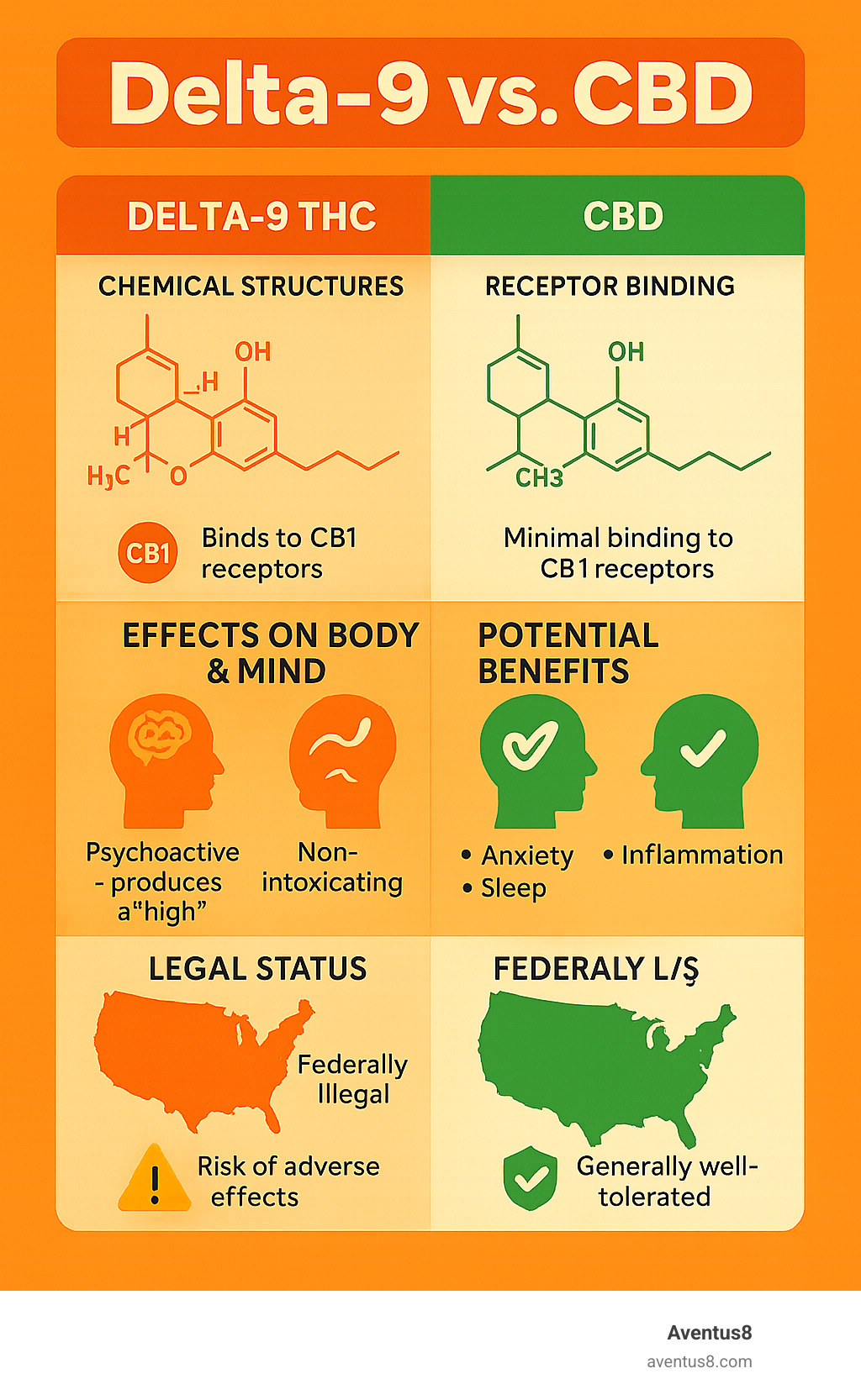
Must-know delta 9 vs CBD terms: - what is delta 9 thc - medical marijuana - is delta 9 safe
Delta 9 vs CBD: Quick Comparison
Stepping into cannabinoids feels a bit like learning a new language. When comparing delta 9 vs CBD, think of them as two cousins from the same family who grew up very differently.
Delta-9 THC is the life of the party—the compound responsible for cannabis's famous "high." It's abundant in marijuana varieties and delivers those euphoric, mind-altering effects that recreational users seek. CBD, meanwhile, is the more laid-back relative—predominantly found in hemp plants and offering potential wellness benefits without making you feel intoxicated.
The timing of effects sets these cannabinoids apart too. Delta-9 works quickly when smoked or vaped, often hitting within minutes and lasting 2-6 hours. Pop a delta-9 gummy instead, and you might wait 30-90 minutes before feeling effects, but they'll stick around longer—sometimes 6-8 hours or more. CBD tends to work more subtly, with effects appearing within 15-30 minutes when taken under the tongue, or 1-2 hours for edibles, typically lasting 4-6 hours.
When it comes to dosing, these cousins have different personalities. Delta-9 THC can be potent even in small amounts, with typical therapeutic doses ranging from 2.5-10mg. Go higher, and you might find yourself dealing with anxiety or paranoia. CBD plays nicer with your system even at higher doses, with most people taking anywhere from 15-100mg depending on their needs.
Delta 9 vs CBD: Chemical Structure
Here's where science gets fascinating. Despite their dramatically different effects, delta 9 vs CBD are actually identical twins on paper—both share the exact same molecular formula: C21H30O2. They're what chemists call structural isomers, meaning they contain identical atoms, just arranged in different patterns.
The magic happens in how these molecules are shaped. Delta-9 THC features a cyclic ring with a double bond at the 9th carbon position (that's where the name comes from). CBD contains all the same building blocks but arranged with an open ring structure and a hydroxyl group that completely changes how it behaves in your body.
This tiny architectural difference explains everything about how differently they affect us. Delta-9's specific structure fits perfectly into your brain's CB1 receptors—like a key sliding into a lock—triggering those psychoactive effects. CBD's structure doesn't fit those receptors well at all, which is why you can take it without feeling "high."
Delta 9 vs CBD: Effects Side-by-Side
The real-world experience of delta 9 vs CBD couldn't be more different. Delta-9 THC creates that characteristic euphoria where colors might seem brighter, music more immersive, and thoughts more profound (or sometimes more scattered). You might find yourself laughing more easily, suddenly hungry, or feeling like time has stretched out. For some, this sensation is blissful; for others, it can tip into anxiety or paranoia.
CBD works more like a subtle background influence. There's no euphoria or intoxication—just a gentle sense of calm and balance. Many users describe feeling "normal, just better"—less anxious, more relaxed, but completely clear-headed and functional. It's like turning down the volume on stress without changing the channel of your day.
The "entourage effect" adds another layer to this comparison. Cannabis plants contain hundreds of compounds that may work better together than in isolation. Full-spectrum CBD products include trace amounts of THC (less than 0.3%) along with other cannabinoids and terpenes, potentially offering improved benefits compared to pure CBD isolate. Similarly, products with balanced THC/CBD ratios often provide THC's benefits with fewer side effects, as CBD can moderate THC's more intense effects.
As one of our customers perfectly put it: "Delta-9 turns up the volume on your senses, while CBD just turns down the static."
How These Cannabinoids Affect the Body & Mind
Ever wonder why delta 9 vs CBD creates such different experiences? The secret lies in how these compounds dance with your body's own internal cannabis system - yes, you actually have one!
Your endocannabinoid system (ECS) was only finded in the 1990s, but it's been regulating your body all along. Think of it as your body's natural balancing act, helping control sleep, mood, appetite, memory, and even pain sensation.
This amazing system has three main parts working together: the endocannabinoids your body naturally produces, receptors these compounds attach to, and enzymes that break everything down when their job is done.
The star players in this system are two types of receptors: CB1 receptors (mostly in your brain and spinal cord) and CB2 receptors (predominantly in your immune system and throughout your body). When cannabinoids enter your system, they interact with these receptors in different ways, creating the varied effects you feel.
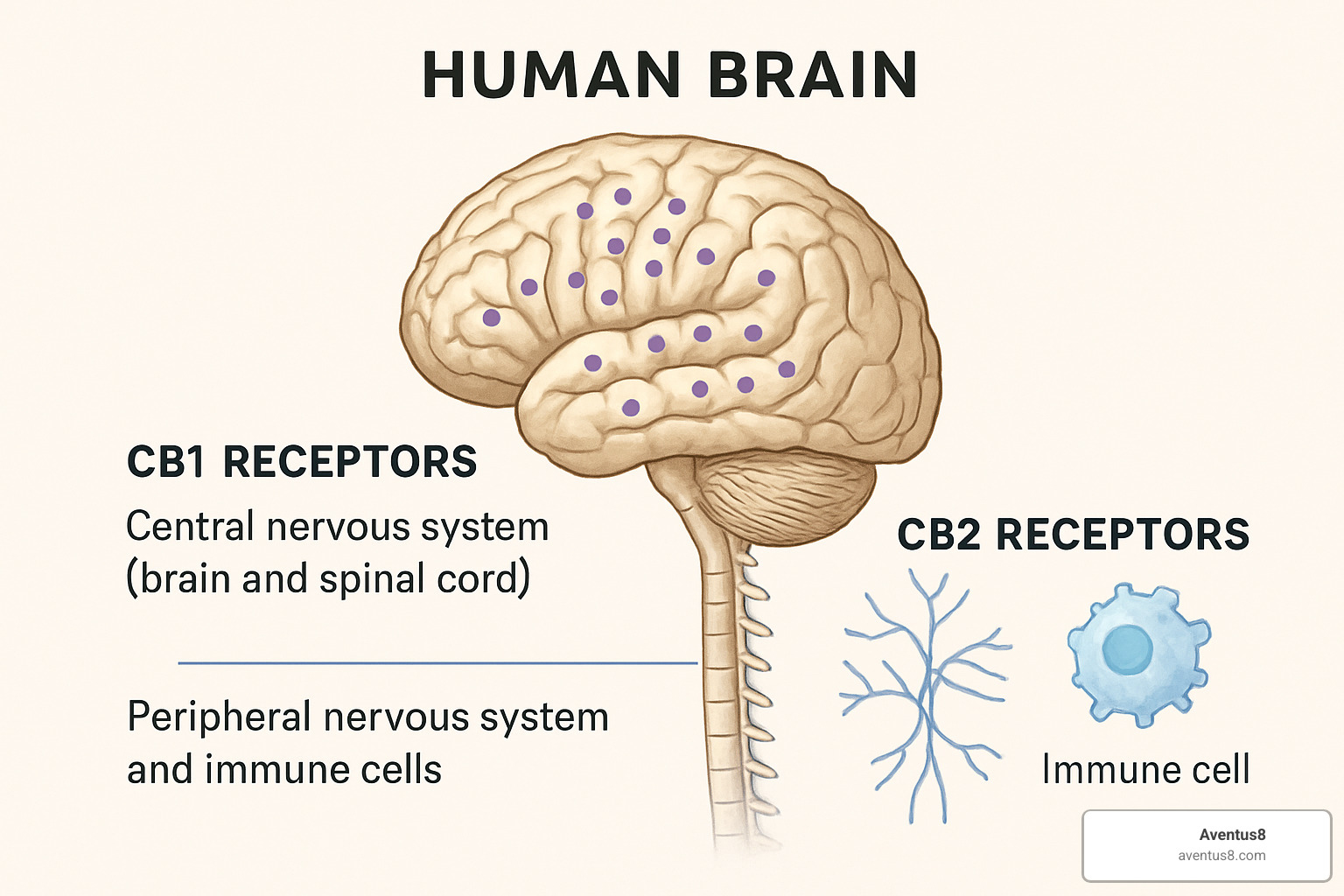
Scientists are still uncovering the amazing complexity of this system. The National Center for Complementary and Integrative Health continues to research how cannabinoids interact with our bodies, revealing new insights about their potential benefits.
Mechanism of Delta-9
Delta-9 THC is like that friend who makes a grand entrance at every party. When it enters your body, it heads straight for your CB1 receptors in the brain and binds directly to them. It's what scientists call a "partial agonist" - it activates these receptors, but not completely.
This binding triggers a cascade of effects throughout your brain. Suddenly, dopamine (your feel-good neurotransmitter) gets released, creating that characteristic euphoric "high." Your perception shifts, time might seem to slow down, and your senses could feel improved.
What's particularly fascinating is how delta-9 engages in "retrograde signaling." In normal brain communication, signals travel in one direction between neurons. But THC flips the script, allowing signals to travel backward, which helps explain how it can dampen pain signals and alter your mood.
Delta-9 also taps into your brain's reward pathway - the same system activated by other pleasurable activities like eating chocolate or falling in love. This dopamine release is partly why some people may develop a dependency with regular use. Your brain starts to associate THC with pleasure and reward.
Mechanism of CBD
CBD, on the other hand, is like that subtle friend who influences the room without being the center of attention. Rather than binding strongly to cannabinoid receptors, CBD takes a more indirect approach through several clever mechanisms:
First, it acts as an "allosteric modulator" of CB1 receptors - fancy talk for changing the receptor's shape so THC and other compounds have a harder time binding to it. This is one way CBD can actually temper the effects of THC, potentially reducing anxiety or paranoia some people experience.
CBD also blocks an enzyme called FAAH that normally breaks down anandamide (your body's natural "bliss" molecule). By inhibiting this enzyme, CBD allows your natural bliss compound to stick around longer, promoting a sense of calm without the high.
Perhaps most interesting is how CBD directly activates serotonin receptors (specifically 5-HT1A). Serotonin helps regulate anxiety, mood, and happiness - which might explain why many people report feeling more relaxed and less anxious with CBD.
CBD also interacts with TRPV1 receptors involved in pain perception, inflammation, and temperature regulation. This multi-faceted approach explains why CBD offers potential benefits without intoxication.
Unlike delta-9, CBD doesn't trigger that flood of dopamine through your reward pathway. This key difference explains why CBD isn't habit-forming and doesn't produce a euphoric high - making it appropriate for daily use for many people seeking wellness benefits without impairment.
At Aventus8, we carefully formulate our products with these mechanisms in mind, ensuring you get the precise effects you're looking for in your wellness journey.
Potential Benefits for Specific Conditions
When it comes to delta 9 vs CBD, think of them as two different tools in your wellness toolkit. Each has its own special talents for tackling various health challenges. The research is still growing, but we're learning more every day about how these plant compounds might help us feel better.
Both cannabinoids show promise for easing pain, calming inflammation, settling upset stomachs, improving sleep, and soothing anxious minds. But they go about these jobs in very different ways – kind of like how a hammer and a screwdriver both help you build things, but you wouldn't use them for the same tasks.
Evidence for Delta-9
Delta-9 THC has been under the microscope for decades, with some impressive research backing up several uses:
For those going through chemotherapy, delta-9 can be a lifesaver when it comes to fighting nausea and vomiting. The FDA approved synthetic versions (dronabinol and nabilone) way back in the 1980s for this very purpose, especially when other anti-nausea meds just aren't cutting it.
People with multiple sclerosis might find relief from muscle spasticity and pain with medications like Sativex, which combines both delta-9 THC and CBD. While this treatment is available in many countries, it's still working its way through approval in the US.
When appetite loss becomes dangerous – like with HIV/AIDS or during cancer treatment – delta-9 THC can help spark hunger when it's desperately needed. The "munchies" effect that recreational users joke about can be truly medicinal for those struggling to maintain weight.
For people battling chronic pain, especially the tricky neuropathic kind that doesn't respond well to regular painkillers, delta-9 THC might offer some relief. It works differently than traditional pain medications, giving hope to those who've tried everything else.
Having trouble sleeping? Delta-9 may help you fall asleep faster and might even improve sleep apnea. The jury's still out on how it affects sleep quality over the long haul, though.
The main downside? Delta-9's psychoactive effects can be a deal-breaker for folks who need to stay sharp during the day or who find the "high" uncomfortable.
Evidence for CBD
CBD has become the research darling in recent years, showing particular promise for:
Seizure disorders represent CBD's strongest success story so far. In 2018, Epidiolex (a purified CBD solution) received FDA approval for treating certain rare forms of epilepsy like Lennox-Gastaut syndrome and Dravet syndrome. The clinical trials were impressive – CBD significantly reduced how often seizures occurred compared to placebo treatments.
For those with anxiety, CBD might be a game-changer. Studies suggest it may help with social anxiety, generalized anxiety disorder, panic attacks, and even PTSD symptoms. One study found that nearly 80% of patients reported feeling less anxious within just one month of starting CBD.
CBD's powerful anti-inflammatory properties make it interesting for conditions like arthritis and inflammatory bowel disease. While much of this research is still in early stages, the results so far are encouraging.
As an antioxidant, CBD actually outperforms vitamins C and E, potentially offering protection for our brain cells against damage. This might eventually prove helpful for conditions involving oxidative stress.
Unlike THC's more direct sedative effect, CBD seems to help with sleep by addressing what's keeping you awake in the first place – whether that's anxiety, pain, or something else. It's like fixing the leak rather than just mopping up the water.
The big advantage of CBD? You get all these potential benefits without feeling "high," making it much more practical for everyday use and for people who want to avoid intoxication altogether.
At Aventus8, we believe in helping you find the right cannabinoid for your specific needs – whether that's delta 9 vs CBD or perhaps a combination of both. Everyone's body is different, and what works best for you might take some gentle exploration.
Safety, Side Effects, and Drug Testing
When it comes to delta 9 vs CBD, understanding their safety profiles might just be the most important part of your decision-making process. After all, what good is relief if it comes with unwanted baggage? Let's talk about what you might experience with each compound – the good, the bad, and everything in between.
Risk Profile of Delta-9
Delta-9 THC definitely carries more potential side effects than its non-intoxicating cousin, mostly because of how it affects your brain:
You might experience dry mouth (hello, cotton mouth!), red eyes that give away your secret, a racing heart, or find yourself unable to drive safely due to impaired coordination. Many users report short-term memory becoming a bit... what was I saying again? Oh right – memory issues, along with time seeming to stretch or compress in strange ways. The munchies are real too, as is the possibility of dizziness.
Perhaps most concerning for some users is the anxiety or paranoia that can show up, especially if you take too much or are in an uncomfortable setting. I've seen it happen – what was supposed to be a relaxing evening turns into hours of "Is everyone looking at me?" Not fun.
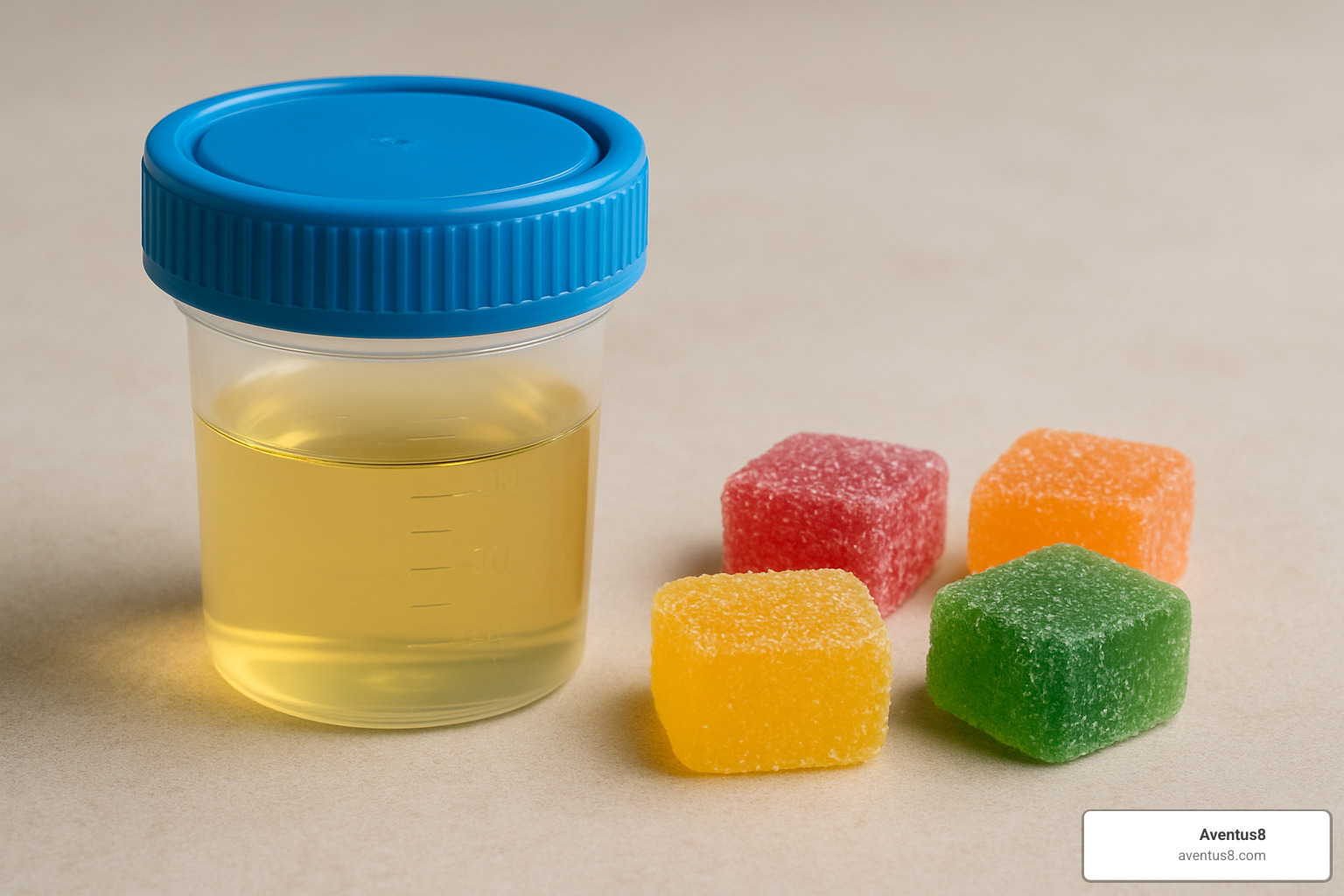
The longer-term concerns are worth noting too. Between 9% and 30% of regular cannabis users develop some degree of dependence, which isn't as severe as with many other substances but can still lead to irritability, sleep problems, and mood issues when stopping after heavy use.
If you're smoking your delta-9, your lungs might protest with bronchitis-like symptoms. And for those with a family history of schizophrenia or psychosis, THC may not be your friend – research suggests it could trigger or worsen these conditions in predisposed individuals.
The drug testing issue is a big one too. Delta-9 THC metabolites love to hang around in your system, potentially showing up on tests for days after a single use or weeks after regular use. If your job does random testing, this is definitely something to consider.
Risk Profile of CBD
CBD, by comparison, is like that easygoing friend who rarely causes drama. Its side effect profile is remarkably milder:
You might feel a bit tired or sleepy (which can actually be a benefit if you're taking it for sleep). Some people experience stomach upset or changes in appetite. Dry mouth happens with CBD too, though typically less severely than with THC.
The biggest safety consideration with CBD isn't about the compound itself but about what it might be doing behind the scenes with your other medications. CBD uses the same liver pathways (those cytochrome P450 enzymes) as many common medications including blood thinners and some antidepressants. This means it could potentially affect how these medications work in your body. Always chat with your doctor if you're mixing CBD with other treatments.
At extremely high doses, CBD might affect liver enzyme levels, but this is primarily a concern if you already have liver issues or take medications that affect the liver.
One real-world concern is product quality. Since the CBD market isn't tightly regulated, what's on the label doesn't always match what's in the bottle. Some products might contain more or less CBD than advertised, or might be contaminated with THC, pesticides, or heavy metals. That's why buying from reputable companies like Aventus8 that provide third-party testing is so important.
As for drug testing, pure CBD isolate shouldn't trigger a positive result on standard tests that look for THC metabolites. However, full-spectrum CBD products contain trace amounts of THC that could potentially show up, especially with regular use or particularly sensitive tests.
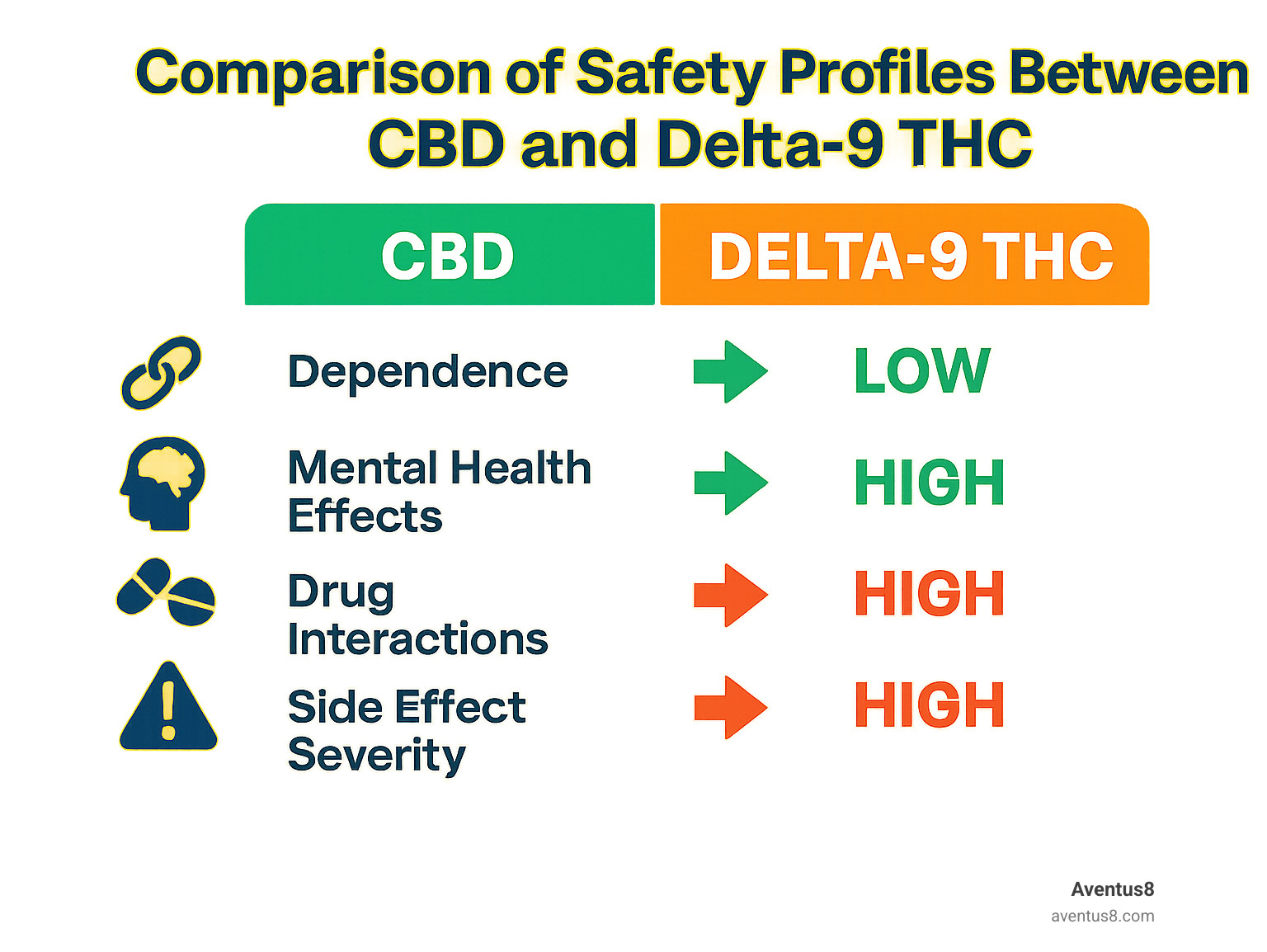
The World Health Organization has given CBD a pretty glowing review, stating it "exhibits no effects indicative of any abuse or dependence potential" and "is generally well tolerated with a good safety profile." That's quite different from delta-9 THC, which does have recognized potential for dependence.
When considering which cannabinoid might be right for you, these safety differences are crucial to weigh alongside the potential benefits. For many people, CBD's gentler profile makes it an appealing first step into cannabinoids, while others find the effects of delta-9 worth managing the additional risks.
Legality, Sourcing, and Quality Control
Navigating the legal landscape of delta 9 vs CBD can feel like trying to read a map that's constantly being redrawn. Let me help clear things up so you can make informed choices about these cannabinoids.
The 2018 Farm Bill created a watershed moment for hemp products by drawing a clear line in the sand: hemp (defined as cannabis with 0.3% or less delta-9 THC by dry weight) became federally legal, while marijuana (cannabis exceeding that 0.3% threshold) remained a Schedule I controlled substance at the federal level.
This means hemp-derived CBD enjoys nationwide legal status, but the picture gets more colorful when we zoom in on state laws. As of 2023, 21 states plus DC have acceptd recreational marijuana, with 37 states offering medical marijuana programs. Even for hemp products, some states have created their own regulatory frameworks that might differ from federal guidelines.
Always check your local laws before purchasing any cannabinoid product – what's perfectly legal in Colorado might land you in hot water in Idaho. And if you're traveling internationally with these products? That's a whole different story, with regulations ranging from complete prohibition to medical allowances to full legalization.
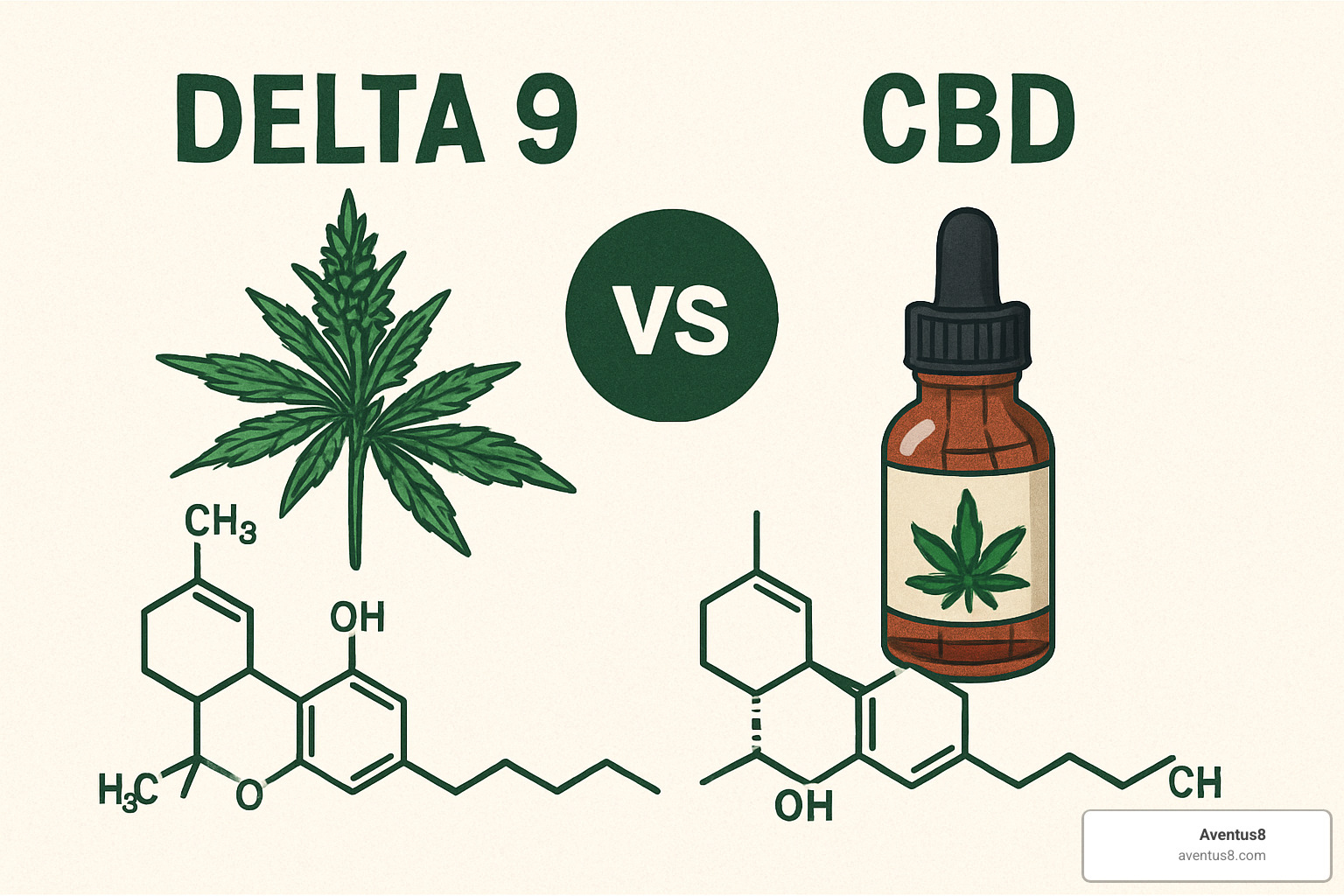
Sourcing and Quality Concerns
The cannabinoid market can sometimes feel like the Wild West, with quality varying dramatically between products. A 2023 study revealed some eye-opening findings: 66% of hemp-derived delta-9 THC products contained more than 10% difference from their stated dosage, with most of these (88.6%) containing less THC than promised.
Perhaps more concerning, nearly half (49%) of hemp delta-9 THC products used THC that had been chemically converted from CBD, rather than naturally occurring delta-9 THC. While many products (84.9%) provided lab reports, a whopping 71.1% of these reports didn't include testing for harmful impurities.
These findings aren't meant to scare you away, but rather to highlight why careful sourcing matters so much. At Aventus8, we believe transparency isn't optional – it's essential. That's why all our products undergo rigorous third-party testing for both potency and purity.
Buying Checklist
When shopping for either delta 9 vs CBD products, think of yourself as a quality detective. Here's what to look for:
Start with the source – organically grown hemp or cannabis minimizes your exposure to unwanted pesticides and contaminants. Next, check how the compounds were extracted; CO2 and ethanol extraction methods are considered clean approaches, while you'll want to avoid products using harsh solvents like butane.
Perhaps most importantly, look for Certificates of Analysis (COAs) from independent laboratories. These reports should verify the exact cannabinoid content, confirm the absence of pesticides and heavy metals, check for microbial safety, and test for any residual solvents. The labeled potency should match what's in the COA within about 10% – anything beyond that suggests poor quality control.
For CBD products specifically, verify that delta-9 THC levels stay below the legal limit of 0.3% if you need to avoid THC. And as a final quality check, companies following Good Manufacturing Practices (GMP) typically produce more consistent, reliable products.
Can You Use Them Together?
Many users find that delta 9 vs CBD isn't an either/or question – these compounds can work beautifully together. Research suggests CBD may actually moderate the effects of THC, potentially dialing down unwanted side effects while preserving the therapeutic benefits.
When used together, CBD may help reduce THC-induced anxiety or paranoia, improve pain relief beyond what either compound achieves alone, extend THC's beneficial effects, and allow lower doses of THC to be effective.
In legal markets, you'll find products with various THC:CBD ratios. A balanced 1:1 ratio often works well for beginners seeking therapeutic effects with minimal intoxication. If you prefer even more subtle effects, ratios with higher CBD content (like 1:4 or 1:20) might be your sweet spot.
For those living where higher-THC products aren't legally accessible, full-spectrum CBD products (containing trace amounts of THC under 0.3%) can provide some of the benefits of this "entourage effect" while remaining federally legal.
The relationship between these two cannabinoids reminds me of dance partners – each has their own style, but together, they create something special that neither could achieve alone.
Conclusion: Choosing the Right Cannabinoid for Your Wellness Goals
So you've made it through our deep dive into delta 9 vs CBD – but which one is right for you? This isn't just about picking a product; it's about finding the perfect match for your personal wellness journey.
If CBD is calling your name, it might be because you're looking for gentle support without the high. CBD shines when you need to stay sharp and focused throughout your day. It's perfect if you're navigating anxiety or inflammation but can't afford to feel intoxicated. Many of our customers choose CBD when they're subject to workplace drug testing or have previously felt anxious or uncomfortable with THC's effects.
On the other hand, delta-9 THC might be your better match if you're specifically targeting conditions where THC truly excels – like managing chemotherapy-induced nausea or stimulating appetite. Many folks genuinely enjoy the euphoric experience that comes with delta-9, finding it helps them unwind and process their day differently. Just remember that timing matters – save your delta-9 products for evenings or days when you don't need to drive or tackle complex tasks.
Many of our happiest customers actually take the "best of both worlds" approach. Combining CBD and delta-9 can create a beautiful synergy, with CBD often softening THC's more intense effects while preserving its benefits. This combo approach works wonders for complex symptoms where the entourage effect really shines.
If you're new to this world, think of CBD as your gentle introduction. Later, if you're curious about delta-9, try microdosing – starting with tiny amounts around 1-2.5mg. This "start low, go slow" approach helps you find your sweet spot while minimizing any unwanted effects.
Your body chemistry is unique – what works beautifully for your friend might feel different for you. Be patient with yourself, pay attention to how you feel, and don't be afraid to adjust your approach. The journey to finding your perfect cannabinoid balance is personal, and sometimes it takes a little experimentation.
Here at Aventus8, we've carefully selected products that meet our rigorous quality standards. Everything we offer is third-party tested for potency and purity, with detailed Certificates of Analysis we're happy to share. We're also proud to offer free shipping and a free gift on orders over $75 within the U.S., making your wellness journey that much smoother.
The science around cannabinoids is constantly evolving, with new research emerging all the time. By choosing high-quality products from trusted sources (like us!), you're positioning yourself to get the most from these remarkable plant compounds.
Explore our full hemp collection to find products that align with your unique needs, or reach out anytime with questions. We're genuinely passionate about helping you find the perfect fit for your wellness goals.

